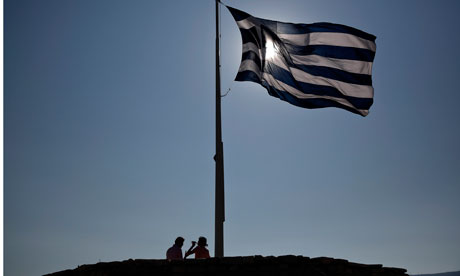Jon Wiltshire guardian.co.uk, Monday 8 July 2013 00.00 AEST
Greece is in crisis and fascism is on the rise, but it still falls far short of the 1930s Berlin chronicled by Christopher Isherwood
Tourists beneath a Greek flag on the Acropolis in Athens. Photograph: Yorgos Karahalis/Reuters
Christopher Isherwood's Goodbye to Berlin chronicles (and partly fictionalises) his time hanging out in the city between late 1930 and early 1933. Towards the end of the book, he urges a friend not to take Nazi death threats too lightly: the Nazis, says Isherwood, are "capable of anything. That's just why they're so dangerous. People laugh at them, right up to the last moment."
Fascism is on the rise in Greece. It's the most perturbing political consequence of the current crisis. Golden Dawn, a far right party whose supporters are accused of violent and sometimes fatal attacks on immigrants, is now polling third. Many Greeks had never heard of them before the crisis. And, like the Nazis, those who knew them once thought them laughable.
I work in Athens and often hear the comparison. At its most pervasive, even Antonis Samaras, Greece's prime minister, likened Greece to the Weimar Republic in an attempt to guilt-trip German policymakers into giving Greece more time to meet the conditions on its loans. Perhaps Goodbye to Berlin's anecdotes from 1930s Germany match my own anecdotal experiences; what can rereading it in today's Athens tell us?
Golden Dawn could well be in Isherwood's book: thuggish beatings, big red flags with black (Hellenicised) swastikas, torch-lit marches, and paramilitary attire. I was recently at a rally of theirs in central Athens (on a church square) and for a party that denies any links with nazism, they do a pretty good job of giving off a neo-Nazi impression. The party uses immigrants as a scapegoat for Greece's problems, and bases its politics on the "ethnic purity" of Greeks (organising "Greek-only" blood donations, for instance).
Golden Dawn has tapped into flourishing anti-EU sentiment in a way that mirrors 1930s German resentment of the punitive treaty of Versailles. And, like the Nazis of the 1930s, Golden Dawn are accused of being in cahoots with the police. In 1932, walking down a busy street after a nearby Nazi rally, Isherwood witnesses two SA brownshirts (the Nazi paramilitaries later superseded by the SS), viciously stab a young man in a doorway in plain sight of the police, who "disregard" the attack.
Maddeningly, Golden Dawn are accused of operating with a similar impunity because, according to Nils Muižnieks, Council of Europe commissioner for human rights, as well as other human rights organisations and rough polls from the last election, the fascist party are supported by a sizeable faction of the police force.
The fearful atmosphere created by a deep economic crisis has, as in 1930s Germany, opened up the political field. Isherwood's landlady is introduced as typical of Berlin's now "bankrupt middle class". Like her, a once-comfortable Greek middle-class has been dragged into economic difficulties, if not into poverty. There's 27% unemployment, with 64% youth unemployment. And from most people you'll hear distressing stories. Golden Dawn has managed to turn some of this distress, and a good deal of fear, into votes.
So, on the surface, the comparison seems frightfully apt. Yet, the details clearly show that Athens is a long way yet from 1930s Berlin. Isherwood's book also chronicles the rise of the extremist left: lines of hand grenades hidden inside communists' overcoats; plans to strategically mount machine guns on rooftops, anticipating the Soviets' arrival; and so on. 1930s Berlin was polarised between anti-democratic extremism. Greece is not.
Golden Dawn acts in an anti-democratic way, yes, but Syriza (the coalition of the left currently polling a close second), is radical, not extremist, and thoroughly democratic. Although the once-mighty centre-left party, Pasok, is more or less finished (despite being in the coalition government, it's polling around 7%), the other ruling centrist party, New Democracy, remains popular. Unlike the end of the Weimar Republic, there hasn't been a complete decline in the popularity of traditional parties.
And unlike Germany, Greece is integrated with the rest of Europe through membership of the EU and the euro. It's tied, for better or for worse, to the fate of everyone else. 1930s Germany was, by contrast, isolated, and Europe was dogged by the threat of war which is, quite obviously, nonexistent today. Despite the suffering of so many ordinary Greeks, the stakes were higher in the 1930s.
Greece is undeniably in crisis. A walk around central Athens will give you a glimpse behind the numbers. And comparing Isherwood's Goodbye to Berlin with today's Athens serves as a useful analogy, teaching us a simple lesson about economic malaise and its direct link with extremist politics. But Greece is not at the brink. To directly compare Greece with the Weimar Republic is, as things stand, misleading. Isherwood left Berlin because the Nazis were seizing power. If he were in Athens today, he wouldn't be saying goodbye; not for a while yet.
![The [Greek] European Tragedy](https://blogger.googleusercontent.com/img/b/R29vZ2xl/AVvXsEiWKI5s90SFm1wWTk6bs4p7CgslaC2SnYPsrZhb-B-smOufNNCSxCvpBLI9hOB-LsXZjir_PNmEiMk2-E62F3xkg96IoC6QFAaZAnPRTVH340IN9WBRmWJqPkjWlgyRj3zpALp7h6hvA58/s920/GkBack_new.jpg)

